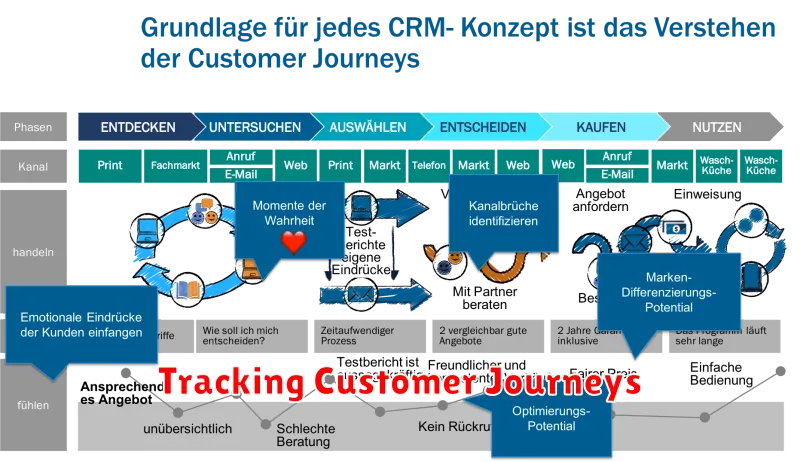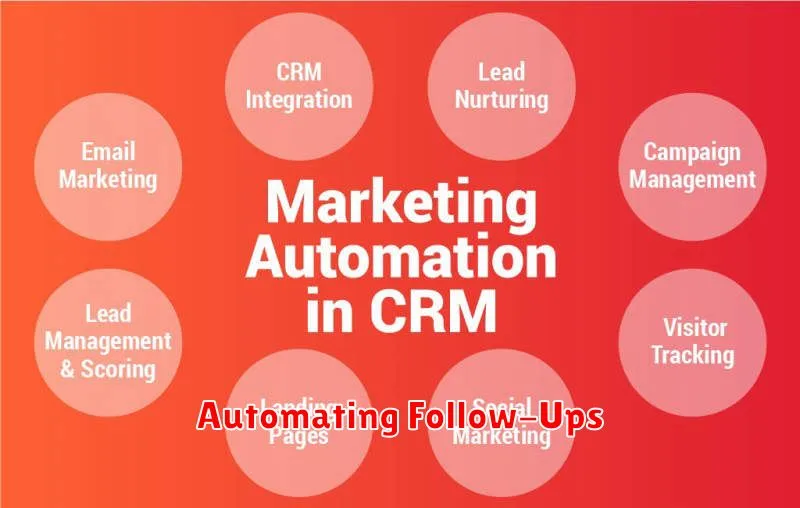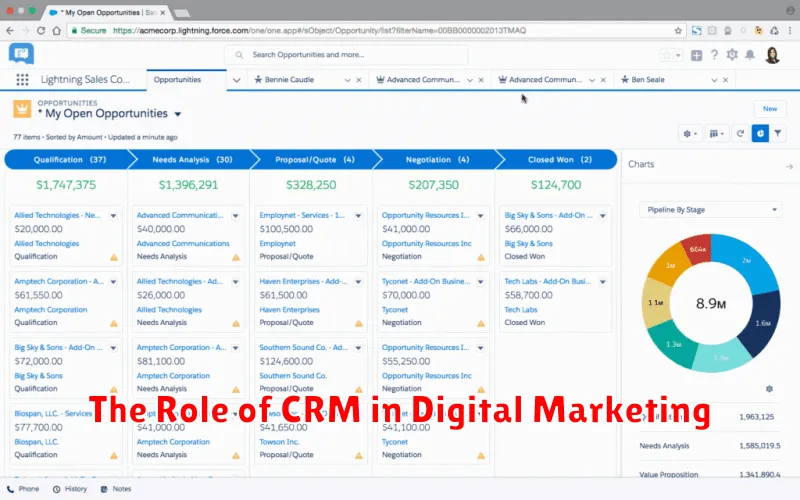In today’s digitally driven marketplace, Customer Relationship Management (CRM) plays a critical role in the success of any digital marketing strategy. CRM systems are no longer simply contact databases; they have evolved into sophisticated platforms that provide valuable insights into customer behavior, preferences, and interactions. By leveraging the power of CRM, businesses can personalize marketing campaigns, enhance customer engagement, and ultimately drive sales growth. This article explores the multifaceted role of CRM in digital marketing and how it enables businesses to achieve their marketing objectives in a competitive landscape. Understanding the integration of CRM and digital marketing is essential for organizations seeking to optimize their marketing ROI and build stronger customer relationships.
Effective digital marketing relies on understanding your target audience and delivering the right message at the right time. CRM provides the essential data and tools to achieve this level of precision. From lead generation and customer segmentation to campaign automation and performance analysis, CRM empowers marketers to execute targeted digital marketing strategies that resonate with their audience. By integrating CRM data into digital marketing channels such as email, social media, and website personalization, businesses can deliver personalized experiences that foster customer loyalty and drive conversions. This article will delve into the specific ways in which CRM enhances digital marketing efforts, providing practical examples and actionable strategies.
What is CRM in Marketing
In the context of marketing, CRM (Customer Relationship Management) is a strategy and technology used to manage and analyze customer interactions and data throughout the customer lifecycle. The goal is to improve business relationships with customers, assist in customer retention, and drive sales growth.
A CRM system compiles customer information across different channels, or points of contact, between the customer and the company. This includes the company’s website, telephone, live chat, direct mail marketing, marketing materials, and social media.
CRM systems can also give customer-facing staff detailed information on customers’ personal information, purchase history, buying preferences, and concerns.
Segmentation and Targeting
CRM systems play a crucial role in segmentation and targeting, enabling marketers to divide their audience into specific groups based on shared characteristics. This granular approach allows for more effective and personalized marketing campaigns.
By leveraging the rich data collected within a CRM, marketers can segment customers based on demographics, purchase history, website activity, and other relevant factors. This detailed segmentation facilitates the creation of highly targeted campaigns that resonate with specific customer segments.
For example, a business might segment its customers based on their purchase frequency, identifying loyal customers for special offers and targeting less engaged customers with re-engagement campaigns. This level of precision maximizes marketing ROI by ensuring that messages are delivered to the right audience at the right time.
Tracking Customer Journeys

A crucial aspect of CRM in digital marketing lies in its ability to track customer journeys. By monitoring customer interactions across various touchpoints, businesses gain valuable insights into customer behavior and preferences.
This tracking allows marketers to understand how customers interact with their brand, from initial awareness to eventual purchase and beyond. By analyzing these journeys, marketers can identify key pain points, optimize marketing campaigns, and personalize customer experiences. Understanding the customer journey empowers businesses to deliver the right message at the right time through the right channel.
CRM systems facilitate this tracking by collecting data from various sources, including website visits, email interactions, social media engagement, and customer service interactions. This consolidated view provides a holistic understanding of each customer’s experience.
Automating Follow-Ups

A key advantage of CRM in digital marketing lies in its ability to automate follow-ups. This eliminates the need for manual outreach, freeing up marketers to focus on strategic initiatives. Automated follow-ups ensure consistent and timely communication with leads, nurturing them through the sales funnel.
CRM systems can be configured to trigger automated responses based on specific actions or predefined timelines. For example, a welcome email can be automatically sent when a user subscribes to a newsletter. Similarly, follow-up emails can be scheduled after a product demo or a website visit.
This automation contributes to increased efficiency and improved lead nurturing, ultimately boosting conversion rates. By automating these repetitive tasks, businesses can maintain consistent engagement with potential customers without requiring constant manual intervention.
Integrating CRM with Ads
Integrating your Customer Relationship Management (CRM) system with your advertising platforms offers significant advantages for digital marketing efforts. This integration allows for highly targeted advertising by leveraging the rich customer data within your CRM.
By connecting these systems, you can create audience segments based on demographics, purchase history, website interactions, and other valuable information. This enables you to deliver personalized ads to specific customer groups, increasing the relevance of your message and improving campaign performance.
For instance, you can target existing customers with ads promoting new products or services that align with their past purchases. Alternatively, you can tailor ad messaging for leads who have interacted with your website but haven’t yet converted. This level of granular targeting minimizes wasted ad spend and maximizes return on investment (ROI).
Using CRM Data for Campaigns
Customer Relationship Management (CRM) systems are invaluable for creating highly targeted and effective marketing campaigns. The data held within a CRM provides a rich understanding of customer behavior, preferences, and demographics. This allows marketers to segment their audience effectively.
Segmentation is a crucial aspect of maximizing campaign ROI. By dividing your audience into specific groups based on shared characteristics, you can tailor your messaging and offers to resonate with individual needs and interests. For example, you could segment by purchase history, website activity, or demographic information like age or location.
Personalization is another key benefit of using CRM data. Instead of generic blasts, CRM-driven campaigns can deliver personalized messages, offers, and product recommendations. This targeted approach leads to higher engagement rates and conversions.
Using CRM data for campaigns allows for continuous optimization. By analyzing campaign performance and customer responses, marketers can refine future campaigns for better results. Tracking metrics like open rates, click-through rates, and conversion rates provides valuable insights into what works and what doesn’t, enabling data-driven decision-making.

